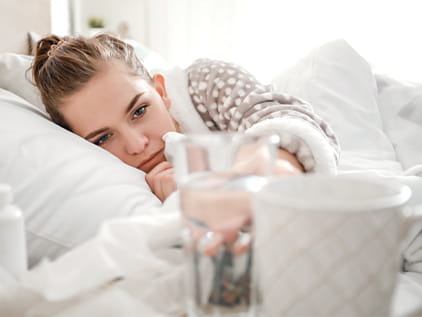January 12, 2022
You’ve checked your results or received the call and COVID-19 is detected. You’re positive. Now the questions are racing: What can I expect? How do I keep my friends and loved ones safe? How long do I need to be in isolation? Should I seek medical attention?
It is normal, if not expected, to have all these questions and more. Here are some of the answers you’re looking for and guidance on what to do next.
Communicate with your healthcare team
Notify your primary care provider and specialists who manage your care about your test results. They may have additional instructions for you. Note: If you are immunocompromised, follow up with your provider as soon as possible.
Stay home and separate (with medical care as the exception)
Remain home, except to get medical care. Separate yourself from other people in your household until you are 10 days from symptom onset, fever-free during the last 24 hours (without the use of fever reducers) and feel improvement in respiratory symptoms. When in common areas of the house (like a hallway, kitchen, etc.), wear a mask.
Treat your symptoms
Plenty of rest and fluid are part of the feel-better equation. Try to drink 114-plus ounces daily (avoid caffeine or alcohol) unless your fluid intake is restricted due to a medical condition. If this is the case, speak to a member of your care team about a fluid goal. Whether you’re suffering from fever and body aches or cough, congestion and runny nose or vomiting and nausea, a number of over-the-counter medications may help subside your symptoms. Contact your healthcare provider and specialists to learn more.
Monitor your symptoms and get help when needed
Monitor your symptoms regularly. It may help to keep a journal or use your smartphone to track your symptoms. Contact your care team if your symptoms worsen. Call 911 if you need emergency services and alert them you have tested positive for COVID-19.

10 things you can do
View the CDC’s fact sheet on how to manage your COVID-19 symptoms at home.
Caring for COVID at home
Dana Hawkinson, MD: Rest. It's hydration and taking in fluids. Water is probably the best. Also, nutrition, making sure that you're eating, keeping your nutrition up. If you need some medicine for fever or aches, certainly you can take some Tylenol and ibuprofen, as directed, to be able to help reduce some of those symptoms. Remember to isolate. If you can try and isolate to help prevent the spread to other people, especially in your household, that's going to be the best thing you can do. If you aren't able to isolate very well, then certainly using a mask in that household is going to be vitally important.
Really, after about 5 days, you can get out of isolation, but if you are going to be around other people, you need to continue to wear that mask for 10 days.
They don't always get sick like humans, but we know that we are able to spread it to those animals, especially those household animals like cats and dogs. I think the recommendation is really to try and isolate away from them as well.
When to call the doctor?
Sometimes, it can be hard to judge when you should call your healthcare provider and when you should wait. Remember: Your health comes first. Be sure to advocate for yourself if you have any of the following symptoms:
- Difficulty breathing that is new or worsens by interfering with your ability to speak in complete sentences while at rest, or if it is accompanied by wheezing.
- Oxygen saturation on room air of 90% or less, regardless of severity of shortness of breath. Oximeter (small devices to measure your oxygen levels) are sold at most local pharmacies.
- Fever is persistently greater than 101 and does not go down with acetaminophen.
- Dizziness or mental status changes, such as confusion, change in behavior and/or difficulty arousing.
- New or worsening symptoms not controlled by over-the-counter medications and home remedies.
If at any time you feel you need urgent or immediate evaluation, call 911 and inform them you have COVID-19.
When to reach out for emergency care?
In the event of a medical emergency, call 911. For COVID-19-positive patients, the following symptoms require immediate medical attention:
- Extreme difficulty breathing, including the inability to speak a full sentence
- Temperature greater than 103.0 F
- Severe or constant chest pain/pressure
- Confusion or inability to be aroused
- Blue lips or face
- Slurred speech
- Seizure
- Coughing up blood
- Too weak to stand
Be sure to tell the 911 operator and first responders you have tested positive for COVID-19.




